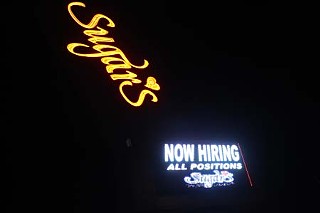The Real Cost of a Lap Dance?
Lawsuit cites violation of wage laws at strip clubs
By Diana Welch, Fri., Oct. 29, 2010

Despite what some billboards around town might lead you to believe, most people do not go to strip clubs for the lunch deals. They go to watch topless women dance up on a stage or, for a little extra dough, up close and personal. Given that the main draw to the clubs is the dancing women, one might be surprised to learn that the clubs don't pay them anything. In fact, dancers pay the clubs.
Here's how the pay structure at a strip club works: The club employs managers, bartenders, and DJs, paying each a wage that falls within federal standards. On the other hand, dancers sign contracts that label them as independent contractors, their wages furnished solely by their customers in tips. In addition, each dancer must pay what's known as a "door fee," which fluctuates depending primarily on the time of her shift. On top of the door fee, each dancer is required to "tip out" a certain amount to her managers, no matter how much she has made in tips for herself. She is also expected to tip the bartender and the DJ. She doesn't like the rules of the house? Fine. Go work somewhere else. One problem: Those same rules will apply to any dancer in any club in town. It's all legal, eagle.
Enter Houston-based lawyer Bob Debes, who's been representing workers in the service industry for more than 20 years. On Oct. 6, he filed a collective action against the owners of two local strip clubs: Perfect 10 Men's Club and Sugar's Uptown Cabaret, seeking back pay for at least four women who have worked in those two clubs within the last three years. The suit alleges that the women are owed minimum wage for the hours they worked, as well as overtime compensation for those weeks they worked more than 40 hours.
What of that contract those women signed when they were hired – the one that's supposed to clear the clubs of any liability because the women knew they were being hired as independent contractors? "It doesn't matter if a person signs a document that classifies her as an independent contractor rather than an employee," says Debes. "It is not binding. It is the Fair Labor Standards Act, the federal wage law that applies to these situations, that determines whether a person is an independent contractor rather than an employee." That goes for strippers, baristas, waiters – Debes says that many in the service industry fall under the Fair Labor Standards Act's protection.
Debes, who says he has filed – and mostly settled – similar lawsuits against local establishments such as Chuy's, the Salt Lick, and Cafe Josie, not to mention various strip clubs in the Houston and Dallas areas, seems certain that he'll win this one. "The courts have uniformly held that these women are employees, not independent contractors," he contends. That's because the dancers aren't in control of their work environment. "The club – who is their employer – sets the work conditions. The dancers are required to charge a certain amount for lap dances. They are required to dance onstage for a certain amount of time. And those are just a few examples."
Calls to the lawyer representing Sugar's and Perfect 10 went unanswered, but we were able to reach a former employee of both clubs who asked that we not use his name. "I've seen girls leave the club in the hole – actually owing the club money after working their shift," he recalls. "Don't get me wrong; the girls also clean up – sometimes walking away with as much as $800 after tip-out."
The bottom line, says Debes, is that the clubs employ the dancers and should be expected to follow wage laws. "This is a job for these women," he explains. "It's unfair that they aren't getting paid properly."
Elizabeth Todd, regional director of the Department of Labor in Dallas, agrees. "Tipped employees are often subject to minimum wage violations from tip-out practices similar to those alleged," she wrote the Chronicle in an e-mail. "Deducting employer costs from required FLSA minimum or overtime wages is illegal."
The clubs' lawyer has until Nov. 11 to respond to Debes' filing. Of his past cases, Debes says that 99% have settled out of court. And even if this case ends in a settlement, he says, the goal is to include a forward-looking agreement requiring the clubs to comply with wage laws. In other words, Debes hopes that with this case, he can get Perfect 10 and Sugar's, as well as other clubs, to comply with federal wage laws by paying at least minimum wage and overtime for the hours their dancers work.
Got something to say on the subject? Send a letter to the editor.








